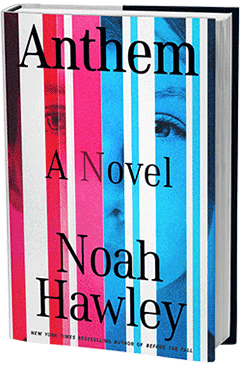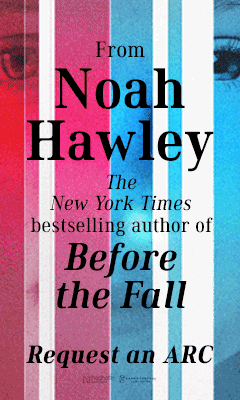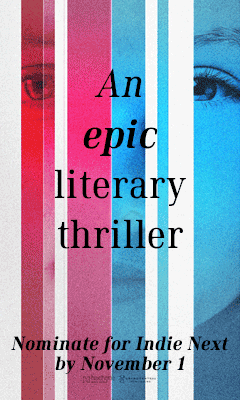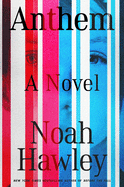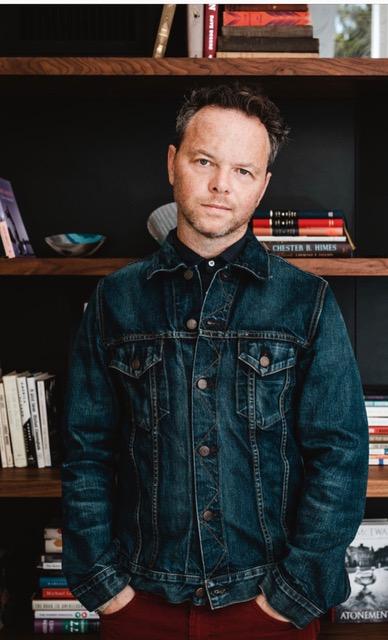Anthem
by Noah Hawley
High-octane anxiety is the prevailing emotion in Noah Hawley's much-anticipated sixth novel, Anthem. Large-scale catastrophe, both human and environmental, is the backdrop against which its ingenious, action-packed plot lines tangle and merge. With a promise early on that "There is drama. There is catharsis" and characters that brilliantly depict the full moral spectrum of humanity, Anthem is laced with the wickedly dark humor for which Hawley (Before the Fall), the creator, director and producer of the television series Fargo, is celebrated.
Anthem is set in the post-pandemic near future, an apocalyptic American summer in which the forests of Alaska are on fire, a ring of smoke surrounds the Pacific Northwest and ghost sightings are on the increase across the country. A new virus rooted in the United States is raging across the world. Organized into five "Books," Anthem starts "Book 1," Slow Violence, with what is sure to join the canon of iconic opening lines: "The summer our children began to kill themselves was the hottest in history." A suicide epidemic among adolescents has led to frantic parents searching for answers and the president's declaration of a national state of emergency. It's far worse than a pandemic because there's no inoculation against "an act of collective surrender" by youngsters who have lost faith in their parents' moral authority and given up on the future.
Liberals blame the suicide epidemic on environmental toxins, while conservative talking heads deny there is a suicide epidemic at all. Civic discourse in Hawley's vividly wrought America has reached a boiling point; dark money and fringe ideologies steadily gain mainstream political influence and revolutionary fervor, fanned by gun-toting vigilantes dressed as clowns hissing across the land. America is having a nervous breakdown.
Meanwhile the stock market still rises; Starbucks introduces a countdown clock not to the end of world but to the return of Pumpkin Spice Latte; and a conservative New York judge, Margot Burr-Nadir, is nominated to the Supreme Court by a liberal, compromise-driven president eager to build coalitions and mend democratic institutions damaged by the destabilizing, rage-fueled actions of the president's predecessor, the God King, who was "banished to Florida to glower and boil."
At the heart of the novel is Simon, a teenager utterly consumed by existential anxiety. His father is CEO of the largest manufacturer of highly addictive prescription opiates. Simon's sister took her own life by overdosing on the pills, a rebuke to her father's greed and moral bankruptcy. The drug hums throughout the background of Anthem, a reminder of its insidious presence in American life.
Simon is on his own drug regime as a patient at the Float Anxiety Abatement Center outside Chicago: "These days when he thinks about happiness and contentment he thinks in terms of milligrams." Simon befriends another patient, Louise, for whom obsessive cleaning helps keep at bay the horrors she experienced at the hands of an evil Jeffrey Epstein-like figure known as the Wizard. The Wizard, a personification of our culture's worst excesses, is kept well supplied with his drug of choice--young girls--by a man known as the Troll.
A third patient, the Prophet, persuades Simon and Louise to escape from the anxiety center and set off on a quest to vanquish the Wizard and build a new city, Utopia, based on a collective system of sharing resources and valuing all life. Adults, power hungry and ignoring the impending destruction of the earth, have lost their way, he preaches. Children must start over and break the cycle of planetary collapse. Simon, the Prophet says, is the one chosen by God to lead the mission, inspiring in the anxious young man an uncertain but hopeful sense of purpose.
Meanwhile in Austin, Tex., Judge Burr-Nadir's estranged daughter, Story, and her boyfriend, Felix, embark on a road trip to rescue Felix's sister, Bathsheba, from the Wizard's compound in West Texas--an expertly crafted parallel plot that will bring readers to the edge of their seats. Story and Felix eventually join forces with Simon, Louise and the Prophet, who have escaped the anxiety center and picked up a curious, but not to be underestimated, cavalry of armed adolescents to help execute the compound attack.
Hawley, a confident and polished writer, has crafted an explosive, multi-genre American novel, offering entertaining cultural commentary as well as intellectually courageous observations on empathy, politics and corruption. At the same time, Anthem is, at its core, a good vs. evil morality tale shedding light on uncomfortable truths about mankind's role in its own erasure. Like the fires raging uncontrolled across the country, Hawley's plot swallows unsavory characters and shifts gears after a thrilling climax, forcefully recalibrating the landscape upon which Simon, Louise, the Prophet and others will have to build their vision of Utopia. The author leaves readers with hope that humankind will, in fact, be rescued from itself. --Shahina Piyarali



